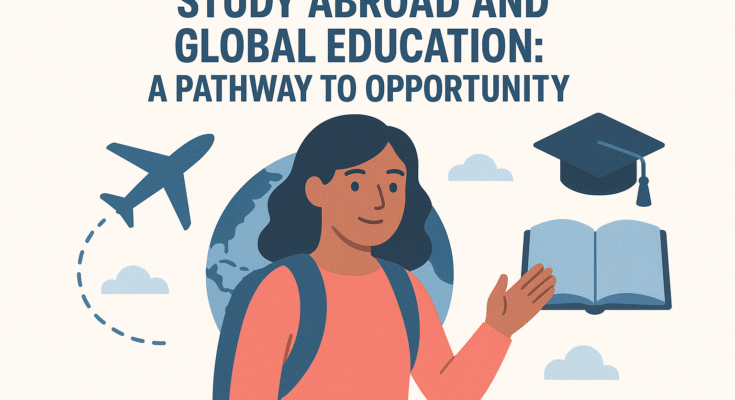Education has always been one of the most powerful tools for shaping a person’s future, and studying abroad takes that experience to an entirely new level. Pursuing higher education in another country is more than an academic decision—it is a life-changing journey that combines learning with cultural immersion, personal growth, and expanded opportunities.
For many students, the dream of studying abroad represents a chance to access world-class institutions, learn from diverse perspectives, and prepare for careers that demand global awareness. While the journey is not without challenges, the rewards of international education can last a lifetime.
The Growing Appeal of International Education
In recent decades, studying abroad has moved from being a rare privilege to a common aspiration. Globalization has made economies and societies more interconnected, and students increasingly see the value of gaining education that crosses borders. Universities across the world are opening their doors to international students, recognizing the mutual benefits of diversity and knowledge exchange.
Parents view international education as an investment in their children’s future, while students see it as an opportunity to expand horizons beyond local boundaries. Access to advanced facilities, specialized programs, and faculty with international expertise makes foreign universities attractive for those seeking to stand out in competitive job markets.
Scholarships, student exchange programs, and government initiatives have also expanded access. This means that studying abroad is no longer limited to wealthy families but is increasingly within reach for students from diverse backgrounds who are motivated to succeed.
Academic Advantages of Studying Abroad
One of the strongest motivations for studying abroad is the quality of education. Many countries host universities that consistently rank among the best in the world, offering programs designed with cutting-edge research and modern teaching methods. Students often find themselves exposed to academic approaches that differ from what they are used to, broadening their intellectual capacity.
Exposure to global perspectives is another major benefit. Studying alongside peers from different cultures and disciplines fosters collaboration and critical thinking. Class discussions become richer, projects become more innovative, and students leave with a broader understanding of global issues.
Specialization is another attraction. Certain fields of study may be more developed in specific countries—whether it is engineering, medicine, arts, or technology. By studying in places where these fields thrive, students gain access to advanced research, internships, and industry connections that might not exist at home.
Personal Growth Through International Experiences
Studying abroad is not only about academics; it is also about personal transformation. Living in a new environment requires independence, adaptability, and problem-solving skills. Students learn to manage daily life in unfamiliar surroundings, from navigating transportation to handling finances.
This independence builds confidence. Students who return from study abroad programs often report being more self-reliant, resilient, and capable of handling challenges. They also develop intercultural communication skills, learning how to respect and adapt to customs different from their own. These experiences prepare them not only for careers but also for life in an interconnected world.
Friendships formed while studying abroad are another priceless outcome. Bonds created with classmates from around the globe often last a lifetime, leading to personal networks that cross continents and cultures. These connections become valuable both personally and professionally.
Career Opportunities After Studying Abroad
Employers increasingly value international experience. Graduates who have studied abroad bring more than just academic credentials—they demonstrate adaptability, problem-solving ability, and cultural awareness. These qualities are highly sought in industries that operate globally, from finance and technology to healthcare and education.
Internships and part-time work opportunities available to international students provide practical experience in addition to classroom learning. Many countries allow international students to work a certain number of hours during their studies, offering both financial support and professional exposure.
Some students also remain in their host countries after graduation, taking advantage of post-study work visas and residency opportunities. This can lead to long-term international careers, opening doors to global mobility and advancement.
Challenges of Studying Abroad
While the benefits are immense, studying abroad does come with challenges. Financial costs can be significant, especially when factoring in tuition, living expenses, travel, and healthcare. However, scholarships, grants, and student loans are often available to ease the burden. Careful planning is essential to manage these expenses.
Cultural adjustment can also be difficult. Language barriers, different social norms, and homesickness are common experiences for international students. Support services offered by universities, along with peer networks, can help students adapt more smoothly.
Legal and administrative processes such as obtaining student visas, arranging accommodation, and understanding healthcare systems require preparation and attention to detail. These tasks can be overwhelming, but with proper guidance, they become manageable.
The Future of Global Education
The landscape of studying abroad is constantly evolving. Advances in technology are reshaping how education is delivered, with hybrid learning and online platforms supplementing traditional classrooms. This flexibility makes international education more accessible to students who may not be able to relocate full-time.
Sustainability is also becoming a major theme in global education. Universities are adopting eco-friendly campuses, integrating environmental studies into curricula, and encouraging research focused on solving global challenges. Students who study abroad today are not only preparing for careers but also contributing to shaping a better future.
Political and economic changes continue to influence student mobility. Immigration policies, international relations, and economic conditions in host countries affect how many students can study abroad and under what conditions. Despite these fluctuations, the overall demand for international education continues to grow as students seek to prepare for an interconnected world.
Final Thoughts
Studying abroad is far more than an academic choice; it is a life decision that shapes personal growth, career potential, and cultural understanding. While challenges exist, from financial pressures to cultural adaptation, the benefits of international education are undeniable. Students gain knowledge, independence, and networks that empower them for a lifetime.
In a world that is increasingly connected, the ability to navigate different cultures, adapt to new environments, and think globally is invaluable. Studying abroad provides not only an education but also an experience that transforms lives. For students who aspire to reach their full potential, few opportunities compare to the journey of learning beyond borders.


